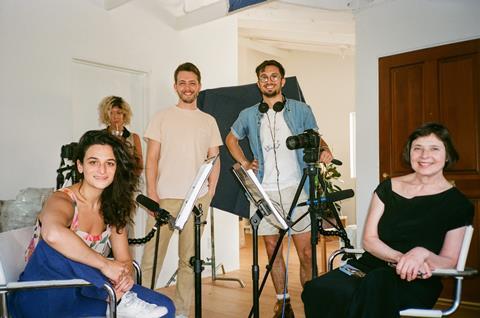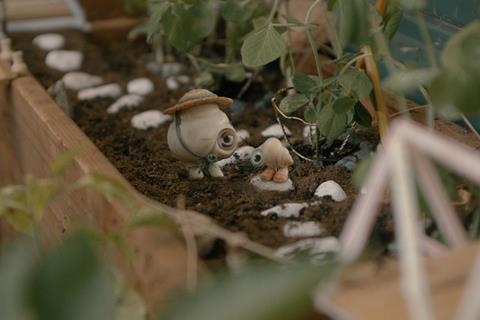Marcel The Shell With Shoes On director Dean Fleischer-Camp and co-creator Jenny Slate tell John Hazelton why they were determined to forge their own path when it came to bringing their creation to the Screen.

After Marcel The Shell’s screen debut (a no-budget three-minute YouTube short) played at Sundance in 2011, the tiny character’s creators Dean Fleischer-Camp and Jenny Slate took a round of meetings with studio executives eager to turn the viral video into a feature film. But, recalls Fleischer-Camp, “The kinds of movies they were pitching to us were pretty squarely in the camp of big-budget tentpole franchises, and I just knew in my heart that that was not the right way to expand this character.”
Marcel, he says “contained so much narrative possibility and so much soul and complexity that I felt any action movie version of him was going to be just scratching the surface of what I love about him.”
That reluctance to take the easy money has paid off with the success of Marcel The Shell With Shoes On, the independently made, stop-motion/live-action hybrid feature that preserves the original short’s lo-fi charm and has emerged as a box-office hit (with $6.3m from North America alone) and serious awards contender (already named the year’s best animated feature by the New York Film Critics Circle and the National Board of Review).
Taking the indie route meant seven years of work for writer/director Fleischer-Camp (whose previous credits include 2016 documentary Fraud) and writer Slate (star of 2014 comedy drama Obvious Child), who also provides Marcel’s tiny but big-hearted voice. Half of those years were spent developing the script about inch-high Marcel, his grandmother Connie (voiced by Isabella Rossellini) and the mysterious tragedy that has separated the pair from their shell community.
Development involved improvisation based on an extensive story treatment, followed by recording sessions for the film’s audio track, with each section of the track then being reshaped into a plot by Fleischer-Camp and writer/editor Nick Paley.
“A lot of being Marcel is about going with what is written and then starting a conversation off of that written experience,” explains Slate. “It’s good to have a plan and then be able to expand the character within the scenes. So the plot is not improvised but a lot of the lines — initially all of them — were improvised.”
When it came to animating the feature, Fleischer-Camp notes that while other kinds of animation were explored, stop-motion — a key element of the original video and its two follow-up shorts — remained the predominant technique. “So much of the soul of the character and what I found fresh and creatively exciting about [Marcel] was related to the stop-motion process,” he says. “I felt like we’d be robbing ourselves of something if we didn’t do it that way.”
A feature-sized budget and the expertise of animation director Kirsten Lepore and digital effects house Chiodo Brothers Productions created new narrative possibilities by allowing Marcel to, among other things, jump, move objects and blink.
“There’s always a danger when you have an increased budget and a much bigger team that you’re going to sand off all the things that made something unique and special to begin with,” Fleischer-Camp notes. “So we were always trying to gut-check it against the original but also figure out how to expand him and expand the emotional range.”
Change in perspective

The film’s emotional resonance may also owe something to a change in the personal relationship between Fleischer-Camp and Slate, who were in the process of getting divorced around the time that work on the project commenced.
The change affected the film “in a pretty positive way,” says Fleischer-Camp. “Sometimes the things that might wear on a daily relationship can actually make a creative relationship much more productive and powerful.”
Slate suggests that the personal history gave the film “layers of the unconscious in a story that doesn’t feel vague or veiled. The story of Marcel is the story of Marcel, it’s not a stand-in for its creators. But our own psyches are embedded in there and it’s a nice way to work through all of it.”
Having opted against studio backing, the Marcel team found most of the funding for their feature from New York-based non-profit Cinereach, backer of adventurous indie films from The Florida Project to After Yang to Oscar-winner Moonlight. And after the finished film had its premiere at Telluride Film Festival in 2021, it was acquired for North America by A24, with Universal Pictures signing on for international markets.
Though A24 (distributor of Moonlight as well as current award contenders The Whale and Everything Everywhere All At Once) is not known for animation, Fleischer-Camp saw the company as the right home for Marcel. “I always felt it would have to be a distributor that saw the film for what it is and not as a potential Minions, or whatever mostly kid-centric film they produced last,” says the director of distribution options. “We went with the distributor that had the most agility and got the film for what it was.”
Marcel’s evolution from viral video curiosity to feature film star — complete with his own official figurine — could be the start of a big career for the character, a possibility to which both of his co-creators appear open.
Actor and stand-up comedian Slate — whose most recent credits include voice work on The Bob’s Burgers Movie and The Secret Life Of Pets 2 as well as a brief appearance in Everything Everywhere All At Once — says she would be happy “to do more with the character in circumstances that felt good”.
Fleischer-Camp — currently preparing to make his first studio film as director of Disney’s live-action remake of Lilo & Stitch — suggests he already has stories for Marcel in mind, though he wants to take a break before returning to the character that he and Slate invented more than a decade ago as the last-minute subject for a film at a friend’s local comedy show.
“After seven years, I feel I need a little refresher project before I go back to Marcel,” he says. “But we’re talking a little bit about ideas for a TV show or a sequel.”
























No comments yet